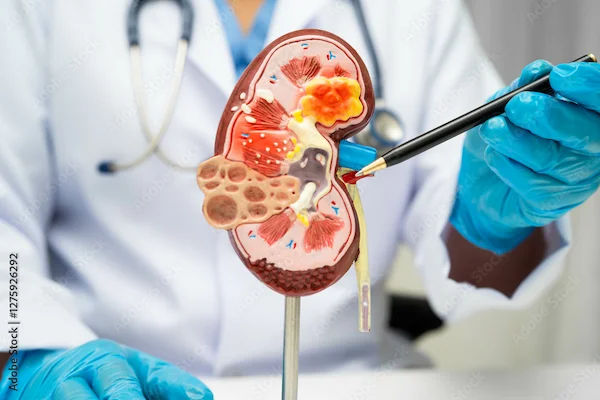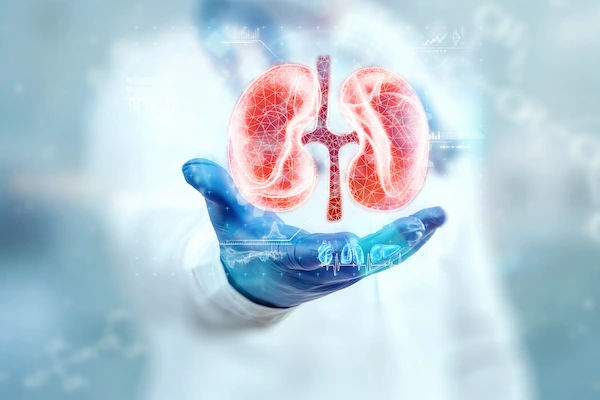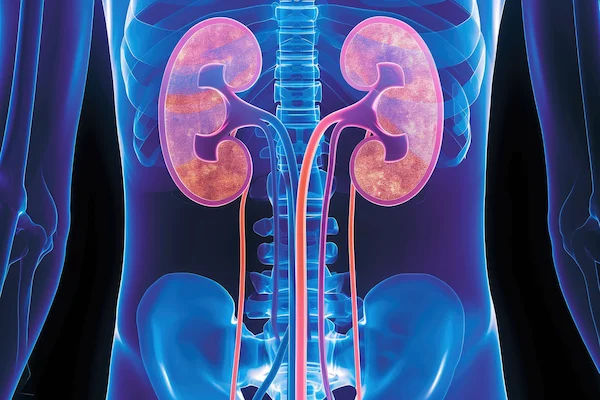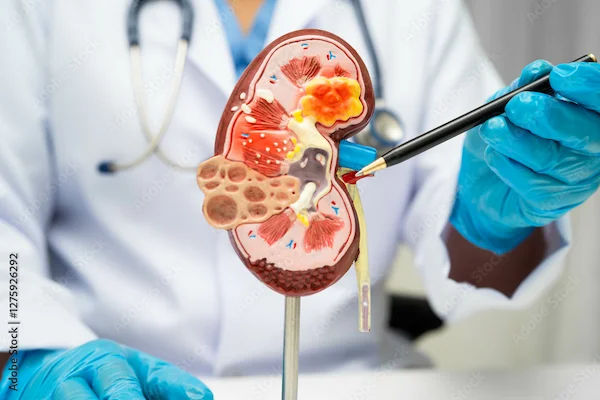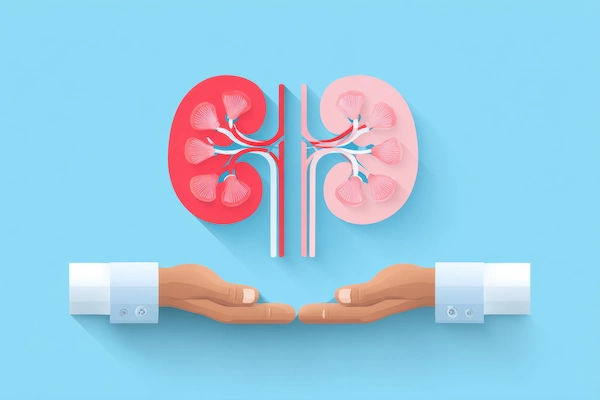Guide to Stages Of Chronic Kidney Disease
Discover the five stages of chronic kidney disease (CKD), what each stage means, the common symptoms, tests like GFR and urine albumin, treatment options, and lifestyle tips for effective management.

Written by Dr. Shaik Abdul Kalam
Reviewed by Dr. Dhankecha Mayank Dineshbhai MBBS
Last updated on 13th Jan, 2026

Introduction
Chronic kidney disease (CKD) is a silent but serious condition affecting millions worldwide. Often, it progresses with few symptoms until the later stages, making early understanding and detection crucial. This guide will walk you through the five stages of CKD, clearly explaining what each one means, the potential symptoms you might experience, and the key actions you can take to protect your kidney health. Whether you've been recently diagnosed, have a family history, or are simply proactive about your well-being, understanding this staging system is the first step toward effective management and maintaining your quality of life. We’ll break down the medical terminology, from GFR to creatinine, into simple, actionable information.
What is Chronic Kidney Disease (CKD)?
Chronic kidney disease means your kidneys are damaged and can't filter blood the way they should. This damage typically happens slowly over a long period. The kidneys are remarkable organs; their job isn't just to produce urine. They are essential for removing waste and extra fluid from your body, balancing salts and minerals, releasing hormones that regulate blood pressure, and supporting bone health. When CKD sets in, this intricate filtering system becomes less efficient, allowing toxins to build up in the body, which can lead to a host of complications.
The Kidneys' Vital Role in Your Body
Think of your kidneys as your body's sophisticated water filtration plant. Every day, they process about 200 quarts of blood to sift out about 2 quarts of waste and extra water, which becomes urine. Beyond this, they:
Regulate Blood Pressure: They release a hormone that constricts blood vessels.
Produce Red Blood Cells: They release erythropoietin, which tells your bone marrow to make red blood cells.
Strengthen Bones: They activate Vitamin D, which is essential for calcium absorption and bone health.
How CKD Develops Over Time
CKD is most commonly caused by conditions that put ongoing strain on the kidneys. The two primary culprits are diabetes (high blood sugar damages delicate kidney filters) and high blood pressure (which can damage the blood vessels within the kidneys). Other causes include autoimmune diseases like lupus, genetic conditions like polycystic kidney disease, and prolonged use of certain medications.
Consult Top Specialists for Personalised Tips
How is Kidney Disease Staged? Understanding Your GFR
Doctors stage CKD based on how well your kidneys are working. The most important measure for this is your glomerular filtration rate (GFR).
What is Glomerular Filtration Rate (GFR)?
Your GFR is a calculation that estimates how much blood passes through the tiny filters in your kidneys (called glomeruli) each minute. A normal GFR is 90 or above, though this can vary with age. As kidney function declines, your GFR number goes down. The staging of CKD from 1 to 5 is directly tied to your GFR result.
The Role of Urine Albumin Tests
GFR isn't the whole story. Doctors also look for protein (albumin) in your urine, a condition called albuminuria or proteinuria. Healthy kidneys keep protein in the blood, but damaged kidneys can leak it into the urine. The amount of albumin in your urine is a key sign of how much kidney damage exists and helps guide treatment decisions. A simple urine test can detect this.
A Deep Dive into the 5 Stages of CKD
Here is a comprehensive breakdown of each stage, including the symptoms of kidney failure in the later phases and what you can do.
Stage 1 Kidney Disease: Early Signs and Preservation
GFR: 90 or higher (indicating normal or high function).
What it means: There is evidence of kidney damage (e.g., protein in urine, physical damage seen on an ultrasound), but kidney function is still normal.
Symptoms: Usually none at all.
Action Plan: The goal is to find and treat the cause of damage and preserve function. This involves controlling blood pressure and blood sugar, adopting a heart-healthy diet, quitting smoking, and avoiding medications that can harm the kidneys (like NSAIDs).
Stage 2 Kidney Disease: Mild Loss and Proactive Management
GFR: 60 to 89
What it means: There is mild loss of kidney function, along with signs of kidney damage.
Symptoms: Still often none. Some people might have slightly elevated blood pressure.
Action Plan: Continue all actions from Stage 1. Your doctor will monitor your GFR and urine albumin more closely. This stage is a critical window for proactive intervention to slow progression.
Stage 3 Kidney Disease: The Middle Ground
This is often when CKD is first detected, sometimes by chance on routine blood work. It’s divided into two sub-stages.
Breaking Down Stage 3a and 3b
Stage 3a: GFR 45-59 (Mild to moderate loss)
Stage 3b: GFR 30-44 (Moderate to severe loss)
Common Symptoms in Stage 3
Symptoms may become noticeable now, including:
Swelling in hands and feet (edema)
Back pain
Urinating more or less than usual
Fatigue and weakness due to anemia
High blood pressure that becomes harder to control
Treatment Goals for Stage 3 CKD
The focus intensifies on slowing the disease. You will likely be referred to a nephrologist (kidney specialist). Treatment includes specific medications (e.g., ACE inhibitors or ARBs to protect the kidneys), dietary changes to reduce protein, sodium, potassium, and phosphorus intake, and treating complications like anemia and bone disease. Many people live for decades in Stage 3 with proper care.
Stage 4 Kidney Disease: Severe Loss and Preparing for the Future
GFR: 15 to 29
What it means: Kidney function is severely reduced. It's time to prepare for potential kidney failure.
Symptoms: All previous symptoms intensify. New ones can appear: nausea, vomiting, bad taste in the mouth, loss of appetite, nerve problems (numbness, tingling), and difficulty concentrating.
Action Plan: In addition to aggressive medical management, you will begin education about treatment options for kidney failure: dialysis (hemodialysis or peritoneal dialysis) and kidney transplant. You may be evaluated for a transplant waitlist or for creating vascular access for dialysis.
Stage 5 Kidney Disease: Kidney Failure (ESRD)
GFR: Less than 15
What it means: The kidneys have lost nearly all ability to function. This is called end-stage renal disease (ESRD). Waste levels become life-threatening.
Understanding End-Stage Renal Disease (ESRD)
At this point, the body can no longer maintain its internal balance. Without treatment, toxins build up, leading to severe illness.
Treatment Options: Dialysis and Transplant
Dialysis: This is a treatment that performs the job of the kidneys—filtering waste and removing extra fluid from the blood. It is a life-sustaining treatment, not a cure.
Kidney Transplant: This involves surgically placing a healthy kidney from a donor into your body. It is the closest thing to a cure for ESRD, offering the best chance for a longer and better quality of life.
How is CKD Diagnosed?
Diagnosis is straightforward and involves two simple tests that your primary care doctor can order:
Blood Test for eGFR: Measures creatinine levels to calculate your GFR.
Urine Test for Albumin-to-Creatinine Ratio (ACR): Checks for protein in the urine.
If these tests are abnormal, your doctor may order an ultrasound or a kidney biopsy to determine the cause of the damage. If you're experiencing persistent symptoms or have risk factors like diabetes, consult a doctor online with Apollo24|7 for further evaluation and to arrange for testing.
Living Well with CKD: Management and Treatment
While CKD is chronic, it is often manageable. A proactive approach can dramatically slow its progression.
The Renal Diet: What to Eat and Avoid
A diet for kidney disease is crucial. It often involves:
Limiting Sodium: To control blood pressure and fluid retention.
Managing Protein: Reducing intake to lessen the kidneys' workload.
Monitoring Potassium and Phosphorus: As kidney function declines, these minerals can build up to dangerous levels in the blood. A dietitian can create a personalised plan for you.
Medications Commonly Used for CKD
Medications are used to treat the cause and complications of CKD:
ACE Inhibitors/ARBs: For blood pressure and to reduce proteinuria.
SGLT2 Inhibitors: A newer class of diabetes drug proven to protect kidney function.
Diuretics: To reduce swelling.
Erythropoiesis-stimulating Agents (ESAs): To treat anemia.
Vitamin D and Calcium Supplements: To support bone health.
The Importance of Lifestyle Changes
Quitting smoking, maintaining a healthy weight, and regular physical activity (as approved by your doctor) are foundational to protecting your kidney and overall cardiovascular health.
Conclusion
Understanding the stages of chronic kidney disease empowers you to take an active role in your health journey. While a CKD diagnosis can feel overwhelming, it's important to remember that progression is often slow and can be influenced by your actions. Early detection and consistent management are your greatest allies. By partnering with your doctor, adopting healthy lifestyle habits, and adhering to your treatment plan, you can protect your kidney function, manage symptoms, and maintain a high quality of life for years to come. If you have concerns about your kidney health or need to get tested, Apollo24|7 offers a convenient home collection for tests like serum creatinine and ACR, making it easy to take the first step toward understanding your numbers.
Consult Top Nephrologist
Consult Top Specialists for Personalised Tips

Dr. Archana Chiniwalar
Nephrologist
6 Years • MBBS, MD (Internal Medicine), DM (Nephrology)
Bengaluru
Apollo Medical Center, Marathahalli, Bengaluru

Dr Vinay Kumar A V
Nephrologist
8 Years • MBBS, MD - General Medicine, DM - Nephrology
Bilaspur
Apollo Hospitals Seepat Road, Bilaspur

Dr. Aswini Kumar Panigrahi
Nephrologist
23 Years • MBBS, MD (Int. Med.), DNB Nephro
Hyderabad
Apollo Hospitals Jubilee Hills, Hyderabad
(225+ Patients)

Dr S P Omkumar
Nephrologist
6 Years • MBBS, MD NEPHRO
Chennai
Apollo Clinic, Valasaravakkma, Chennai

Dr. Pardha Saradhi
Nephrologist
9 Years • MBBS, MD-DNB (Gen. Med.), DNB (Nephro)
Hyderabad
Apollo Hospitals D R D O kanchanbagh, Hyderabad
(75+ Patients)
Consult Top Nephrologist

Dr. Archana Chiniwalar
Nephrologist
6 Years • MBBS, MD (Internal Medicine), DM (Nephrology)
Bengaluru
Apollo Medical Center, Marathahalli, Bengaluru

Dr Vinay Kumar A V
Nephrologist
8 Years • MBBS, MD - General Medicine, DM - Nephrology
Bilaspur
Apollo Hospitals Seepat Road, Bilaspur

Dr. Aswini Kumar Panigrahi
Nephrologist
23 Years • MBBS, MD (Int. Med.), DNB Nephro
Hyderabad
Apollo Hospitals Jubilee Hills, Hyderabad
(225+ Patients)

Dr S P Omkumar
Nephrologist
6 Years • MBBS, MD NEPHRO
Chennai
Apollo Clinic, Valasaravakkma, Chennai

Dr. Pardha Saradhi
Nephrologist
9 Years • MBBS, MD-DNB (Gen. Med.), DNB (Nephro)
Hyderabad
Apollo Hospitals D R D O kanchanbagh, Hyderabad
(75+ Patients)
More articles from Kidney Disease
Frequently Asked Questions
Can you reverse chronic kidney disease?
While the damage from CKD is usually permanent, you can often slow or even stop the progression, especially in the early stages, with effective treatment of the underlying cause and lifestyle changes.
What is the life expectancy for someone with stage 3 kidney disease?
Life expectancy varies widely based on age, overall health, and how well the disease is managed. Many people with stage 3 CKD live for several decades without progressing to kidney failure, particularly with excellent medical care and lifestyle adjustments.
What are the first signs of kidney problems?
Early signs are subtle but can include fatigue, trouble sleeping, poor appetite, muscle cramps, swollen feet/ankles, puffiness around the eyes, and dry, itchy skin. However, these often don't appear until later stages.
How can I improve my GFR naturally?
You cannot dramatically 'improve' a truly low GFR, but you can help preserve it by: staying well-hydrated (unless advised otherwise), eating a kidney-friendly diet, controlling blood pressure and sugar, exercising, and avoiding NSAIDs (e.g., ibuprofen) and other kidney-toxic substances.
What is the main difference between Stage 3a and 3b CKD?
The difference is the level of kidney function loss. Stage 3a is a GFR of 45-59 (milder loss), while Stage 3b is a GFR of 30-44 (more significant loss). The risk of complications like cardiovascular disease and progression to later stages is higher in 3b.
